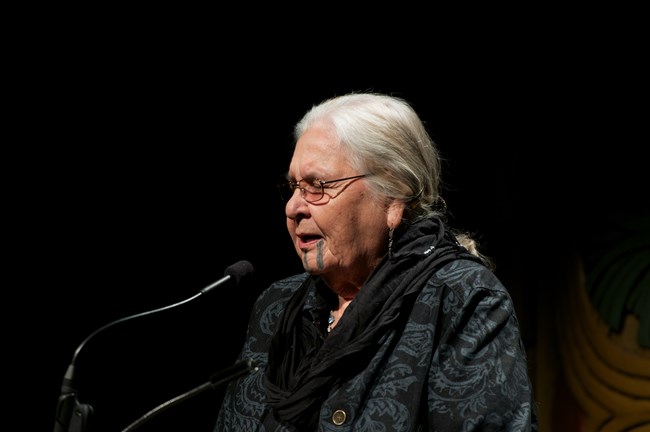Part of a series of articles titled Women's History in the Pacific West - Columbia-Pacific Northwest Collection.
Previous: Kimiko Kaye Tambara
Next: Margaret Frink
Article

Courtesy of Sam Beebe, Ecotrust.
Before her death on November 27, 2019 at the age of 95, Agnes Baker-Pilgrim was the oldest living member of the Takelma Tribe.1 Better known as Grandma Aggie, Baker-Pilgrim was deeply committed to her role as a tribal elder. She mentored Indigenous youth in Oregon while traveling the world well into her eighties as an activist for Indigenous and environmental rights. The Oregon Caves National Monument is part of the Takelma Tribe’s ancestral homelands, where they lived for thousands of years before American colonization radically altered their way of life. Baker-Pilgrim was an important advocate for recovering traditional ceremonies and fighting for Indigenous sovereignty into the twenty-first century, and her work has impacted the land and watershed around Oregon Caves.
Agnes Emma Baker, or Taowhywee in her native language, was born to George (Coos) and Evaline (Takelma) on September 11, 1924, the same year the US government extended US citizenship to all Native Americans.2 In 1870, Evaline’s father, George Harney, was elected the first chief of the new Confederated Tribes of Siletz Indians, created after people from 27 different tribes were forced onto reservations in the 1850s.3 Agnes Baker and her eight siblings were raised on the Siletz reservation, where they had to balance their Native traditions with Anglo expectations. She recalled speaking the Takelma language only at home and defying the Catholic church’s prohibition against traditional dances.4 As an adult, Baker-Pilgrim took on a series of diverse jobs from nightclub bouncer to stockcars racer to scrub nurse, all while raising six children.5
Around 1970, at the age of 45, Baker-Pilgrim found herself feeling “a restlessness” and soon became “a prayer person” committed to the “spiritual path.”6 This spirituality motivated her next fifty years of activism. Working with her third husband, Grant Pilgrim, of the Yurok Tribe, Baker-Pilgrim, in 1994, revived the Salmon Ceremony on the Applegate River for the first time in 140 years (since the Rogue River Wars of the 1850s).7 The Salmon Ceremony honors the returning salmon and is “an act of sharing and reciprocity for all people.”8 Thirteen years later the Ceremony finally returned to Ti’lomikh Falls on Rogue River, where it had been conducted for thousands of years before U.S. colonization.9 Baker-Pilgrim also improved salmon ecosystems by successfully lobbying for the removal of dams on the Klamath and Rogue Rivers.10
Education played a central role in Baker-Pilgrim’s activism. She attended college in her late fifties, graduating from Southern Oregon University with a degree in psychology and a minor in Native American Studies in 1985.11 In 1994, she collaborated with her husband Grant and professors from Southern Oregon University to create a Native American Youth Academy at the university called Konaway Nika Tillicum, which translates to “all my relations.”12 At this week-long program for Indigenous youth throughout Oregon, tribal elders and leaders prepare students from seventh to twelfth grade for higher education, while also promoting self-determination and strengthening community ties.13
Baker-Pilgrim’s identity as a grandmother to 18, great-grandmother to 27, and great great-grandmother to one child also fueled her advocacy.14 In October 2004, she was a founding member and the first chair of the International Council of Thirteen Indigenous Grandmothers. The council describes itself as a global alliance “to protect the lands where our people live and upon which our cultures depend, to safeguard the collective heritage of traditional medicines, and to defend the Earth Herself.”15 Baker-Pilgrim used this council to fight for the rights of Indigenous peoples, animals, and water around the world, being “a voice for the voiceless,” as she often described herself.16 Through her many programs and personal relationships, Grandma Aggie left behind a strong foundation to protect future generations and environments, including at Oregon Caves.
Part of a series of articles titled Women's History in the Pacific West - Columbia-Pacific Northwest Collection.
Previous: Kimiko Kaye Tambara
Next: Margaret Frink
Last updated: February 22, 2022